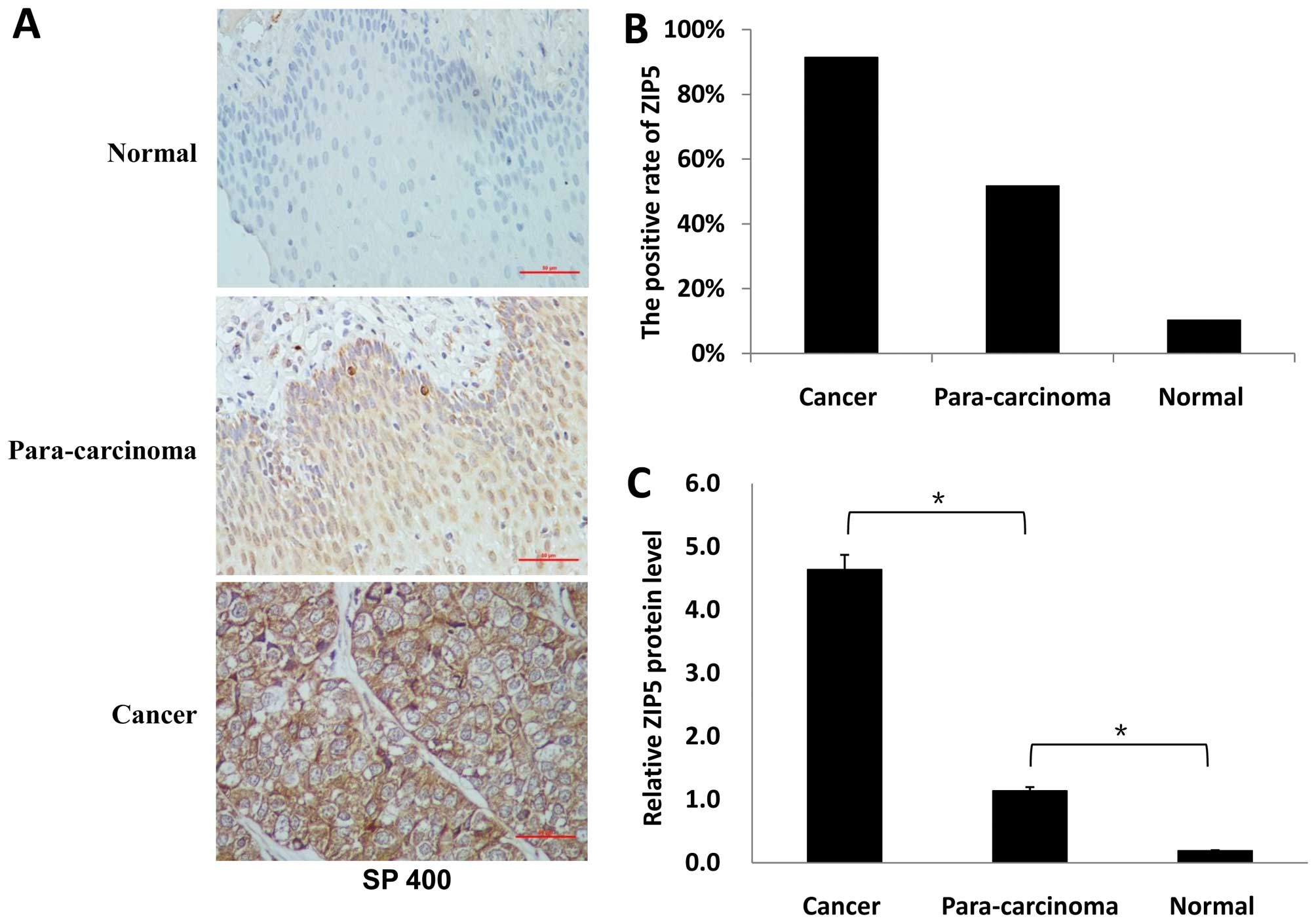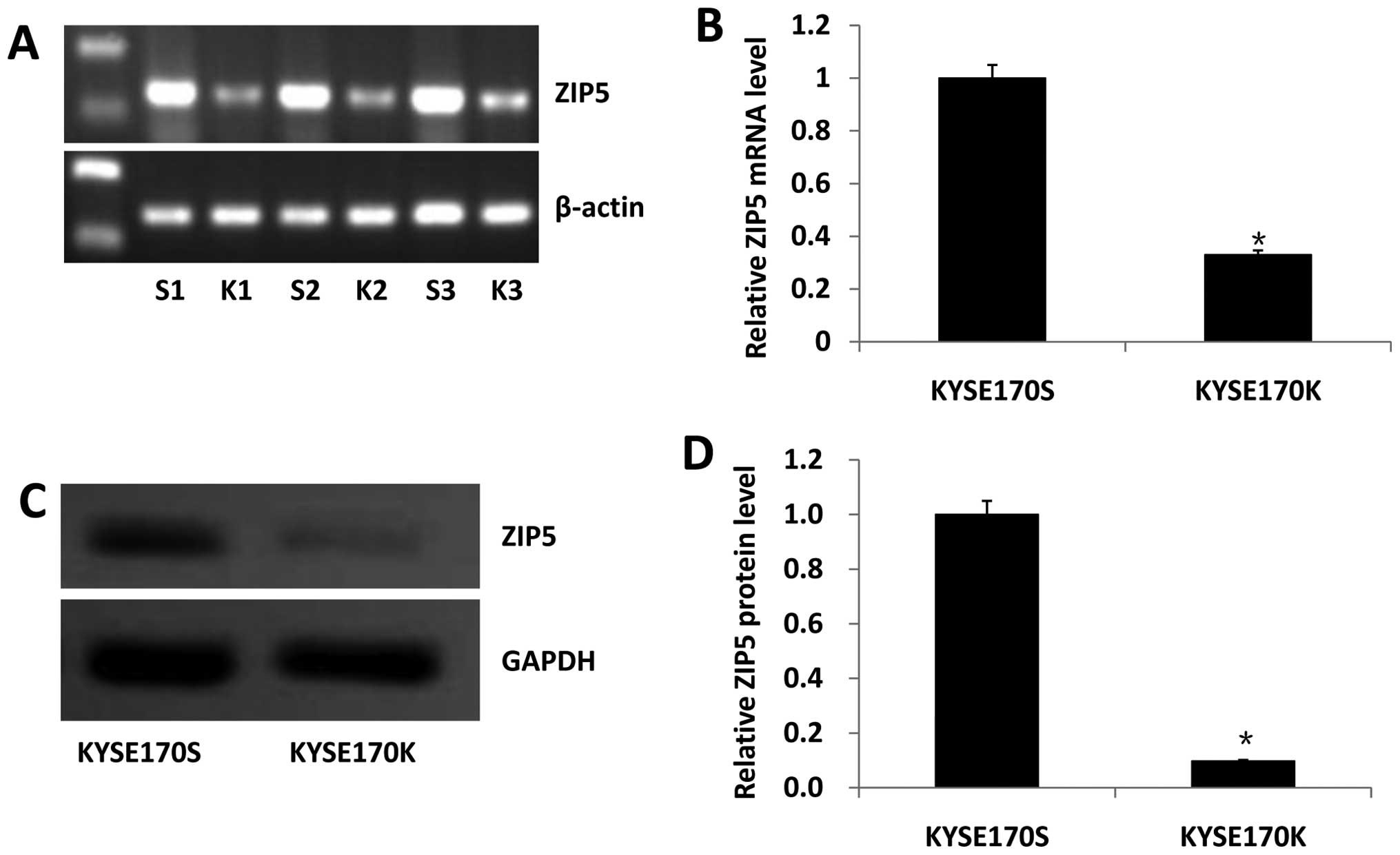|
1
|
GLOBOCAN 2012: Estimated Cancer Incidence,
Mortality and Prevalence Worldwide in 2012. http://globocan.iarc.fr/Pages/fact_sheets_cancer.aspx.
2012
|
|
2
|
Zeng H, Zheng R, Guo Y, Zhang S, Zou X,
Wang N, Zhang L, Tang J, Chen J, Wei K, et al: Cancer survival in
China, 2003–2005: A population-based study. Int J Cancer.
136:1921–1930. 2015. View Article : Google Scholar
|
|
3
|
Zou XN, Taylor PR, Mark SD, Chao A, Wang
W, Dawsey SM, Wu YP, Qiao YL and Zheng SF: Seasonal variation of
food consumption and selected nutrient intake in Linxian, a high
risk area for esophageal cancer in China. Int J Vitam Nutr Res.
72:375–382. 2002. View Article : Google Scholar
|
|
4
|
Makhov P, Golovine K, Uzzo RG, Wuestefeld
T, Scoll BJ and Kolenko VM: Transcriptional regulation of the major
zinc uptake protein hZip1 in prostate cancer cells. Gene.
431:39–46. 2009. View Article : Google Scholar :
|
|
5
|
Iguchi K, Otsuka T, Usui S, Sugimura Y and
Hirano K: Correlation between ZIP2 messenger RNA expression and
zinc level in rat lateral prostate. Biol Trace Elem Res.
112:159–167. 2006. View Article : Google Scholar : PubMed/NCBI
|
|
6
|
Li M, Zhang Y, Liu Z, Bharadwaj U, Wang H,
Wang X, Zhang S, Liuzzi JP, Chang SM, Cousins RJ, et al: Aberrant
expression of zinc transporter ZIP4 (SLC39A4) significantly
contributes to human pancreatic cancer pathogenesis and
progression. Proc Natl Acad Sci USA. 104:18636–18641. 2007.
View Article : Google Scholar : PubMed/NCBI
|
|
7
|
Wu C, Li D, Jia W, Hu Z, Zhou Y, Yu D,
Tong T, Wang M, Lin D, Qiao Y, et al: Genome-wide association study
identifies common variants in SLC39A6 associated with length of
survival in esophageal squamous-cell carcinoma. Nat Genet.
45:632–638. 2013. View
Article : Google Scholar : PubMed/NCBI
|
|
8
|
Taylor KM, Vichova P, Jordan N, Hiscox S,
Hendley R and Nicholson RI: ZIP7-mediated intracellular zinc
transport contributes to aberrant growth factor signaling in
antihormone-resistant breast cancer Cells. Endocrinology.
149:4912–4920. 2008. View Article : Google Scholar : PubMed/NCBI
|
|
9
|
Hogstrand C, Kille P, Nicholson RI and
Taylor KM: Zinc transporters and cancer: A potential role for ZIP7
as a hub for tyrosine kinase activation. Trends Mol Med.
15:101–111. 2009. View Article : Google Scholar : PubMed/NCBI
|
|
10
|
Wang F, Kim BE, Petris MJ and Eide DJ: The
mammalian Zip5 protein is a zinc transporter that localizes to the
basolateral surface of polarized cells. J Biol Chem.
279:51433–51441. 2004. View Article : Google Scholar : PubMed/NCBI
|
|
11
|
Dufner-Beattie J, Kuo YM, Gitschier J and
Andrews GK: The adaptive response to dietary zinc in mice involves
the differential cellular localization and zinc regulation of the
zinc transporters ZIP4 and ZIP5. J Biol Chem. 279:49082–49090.
2004. View Article : Google Scholar : PubMed/NCBI
|
|
12
|
Kumar A, Chatopadhyay T, Raziuddin M and
Ralhan R: Discovery of deregulation of zinc homeostasis and its
associated genes in esophageal squamous cell carcinoma using cDNA
microarray. Int J Cancer. 120:230–242. 2007. View Article : Google Scholar
|
|
13
|
Bosetti C, Levi F, Ferlay J, Garavello W,
Lucchini F, Bertuccio P, Negri E and La Vecchia C: Trends in
oesophageal cancer incidence and mortality in Europe. Int J Cancer.
122:1118–1129. 2008. View Article : Google Scholar
|
|
14
|
Gaither LA and Eide DJ: Eukaryotic zinc
transporters and their regulation. Biometals. 14:251–270. 2001.
View Article : Google Scholar
|
|
15
|
Franklin RB and Costello LC: Zinc as an
anti-tumor agent in prostate cancer and in other cancers. Arch
Biochem Biophys. 463:211–217. 2007. View Article : Google Scholar : PubMed/NCBI
|
|
16
|
Uzzo RG, Crispen PL, Golovine K, Makhov P,
Horwitz EM and Kolenko VM: Diverse effects of zinc on NF-kappaB and
AP-1 transcription factors: Implications for prostate cancer
progression. Carcinogenesis. 27:1980–1990. 2006. View Article : Google Scholar : PubMed/NCBI
|
|
17
|
Fong LY, Sivak A and Newberne PM: Zinc
deficiency and methylbenzylnitrosamine-induced esophageal cancer in
rats. J Natl Cancer Inst. 61:145–150. 1978.PubMed/NCBI
|
|
18
|
Fong LY, Lau KM, Huebner K and Magee PN:
Induction of esophageal tumors in zinc-deficient rats by single low
doses of N-nitrosomethylbenzylamine (NMBA): Analysis of cell
proliferation, and mutations in H-ras and p53 genes.
Carcinogenesis. 18:1477–1484. 1997. View Article : Google Scholar : PubMed/NCBI
|
|
19
|
Fong LY and Magee PN: Dietary zinc
deficiency enhances esophageal cell proliferation and
N-nitrosomethylbenzylamine (NMBA)-induced esophageal tumor
incidence in C57BL/6 mouse. Cancer Lett. 143:63–69. 1999.
View Article : Google Scholar : PubMed/NCBI
|
|
20
|
Fong LY, Nguyen VT and Farber JL:
Esophageal cancer prevention in zinc-deficient rats: Rapid
induction of apoptosis by replenishing zinc. J Natl Cancer Inst.
93:1525–1533. 2001. View Article : Google Scholar : PubMed/NCBI
|
|
21
|
Abnet CC, Lai B, Qiao YL, Vogt S, Luo XM,
Taylor PR, Dong ZW, Mark SD and Dawsey SM: Zinc concentration in
esophageal biopsy specimens measured by X-ray fluorescence and
esophageal cancer risk. J Natl Cancer Inst. 97:301–306. 2005.
View Article : Google Scholar : PubMed/NCBI
|
|
22
|
Palmiter RD and Findley SD: Cloning and
functional characterization of a mammalian zinc transporter that
confers resistance to zinc. EMBO J. 14:639–649. 1995.PubMed/NCBI
|
|
23
|
Liuzzi JP and Cousins RJ: Mammalian zinc
transporters. Annu Rev Nutr. 24:151–172. 2004. View Article : Google Scholar : PubMed/NCBI
|
|
24
|
Kagara N, Tanaka N, Noguchi S and Hirano
T: Zinc and its transporter ZIP10 are involved in invasive behavior
of breast cancer cells. Cancer Sci. 98:692–697. 2007. View Article : Google Scholar : PubMed/NCBI
|
|
25
|
Song X, Lin HP, Johnson AJ, Tseng PH, Yang
YT, Kulp SK and Chen CS: Cyclooxygenase-2, player or spectator in
cyclooxygenase-2 inhibitor-induced apoptosis in prostate cancer
cells. J Natl Cancer Inst. 94:585–591. 2002. View Article : Google Scholar : PubMed/NCBI
|
|
26
|
Fukazawa EM, Baiocchi G, Soares FA,
Kumagai LY, Faloppa CC, Badiglian-Filho L, Coelho FR, Gonçalves WJ,
Costa RL and Góes JC: COX-2, EGFR, and ERBB-2 expression in
cervical intraepithelial neoplasia and cervical cancer using an
automated imaging system. Int J Gynecol Pathol. 33:225–234. 2014.
View Article : Google Scholar : PubMed/NCBI
|
|
27
|
Dohadwala M, Luo J, Zhu L, Lin Y,
Dougherty GJ, Sharma S, Huang M, Pold M, Batra RK and Dubinett SM:
Non-small cell lung cancer cyclooxygenase-2-dependent invasion is
mediated by CD44. J Biol Chem. 276:20809–20812. 2001. View Article : Google Scholar : PubMed/NCBI
|
|
28
|
Costa C, Soares R, Reis-Filho JS, Leitão
D, Amendoeira I and Schmitt FC: Cyclo-oxygenase 2 expression is
associated with angiogenesis and lymph node metastasis in human
breast cancer. J Clin Pathol. 55:429–434. 2002. View Article : Google Scholar : PubMed/NCBI
|
|
29
|
Smyth GP, Stapleton PP, Barden CB, Mestre
JR, Freeman TA, Duff MD, Maddali S, Yan Z and Daly JM: Renal cell
carcinoma induces prostaglandin E2 and T-helper type 2 cytokine
production in peripheral blood mononuclear cells. Ann Surg Oncol.
10:455–462. 2003. View Article : Google Scholar : PubMed/NCBI
|


















